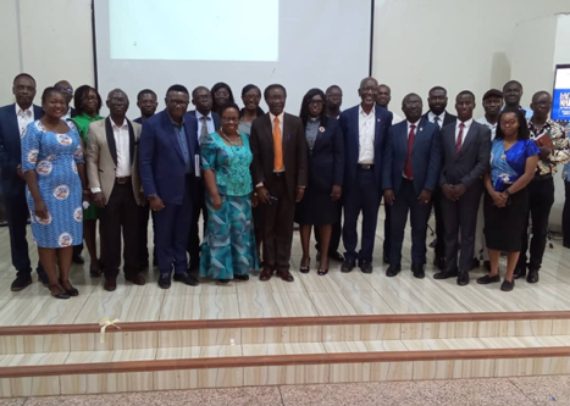Prof. David Asamoah (3rd right) with other dignitaries
Christian Service University (CSU) has officially launched the maiden edition of its academic journal, the Journal of Applied Science, Arts and Business (JASAB), at a ceremony held on its campus in Kumasi.
Delivering the keynote address, Professor David Asamoah, Pro Vice-Chancellor of the Kwame Nkrumah University of Science and Technology (KNUST), commended CSU for achieving what he described as a significant milestone in global scholarship and research excellence.
“Launching a journal is no small feat,” Prof. Asamoah remarked and added, “It is a testament to CSU’s vision to promote original thought and critical discourse within and beyond its academic borders.”
He applauded the editorial team, contributors, and the university community for their scholarly rigour, commitment, and passion for knowledge production.
“This journal must become not just a publication but a legacy,” he stated and noted, “With commitment and innovation, JASAB can rise to become a top-tier journal, amplifying the voices of your scholars and enriching the global body of knowledge.”
CSU’s Academic Milestone
The launch of JASAB marks a major step in Christian Service University’s journey to cement its place in academic research and publication—particularly in the fields of Applied Science, Arts, and Business.
Editor-in-Chief Rev. Prof. Yaw Adu-Gyamfi announced that the journal has already recorded significant milestones, including ISSN registration, the development of an interactive website, and the formation of an international advisory board comprising scholars from Ghana, Nigeria, Eswatini, Australia, Denmark, and New Zealand.
JASAB’s maiden issue features 15 scholarly contributions—13 research papers and two book reviews—selected from 30 submissions. Contributors include scholars from Ghana, Kenya, Nigeria, and South Africa, representing 12 academic institutions.
A Vision Fulfilled
In his welcome address, CSU Vice Chancellor, Prof. Sam K. Afrane, revealed that although there had been a previous attempt with the Journal of Applied Science, Arts and Theology (JASAT), it lacked the standard and reach required to fulfil the university’s vision.
“The vision was never absent—but the absence of the right leadership and consistent commitment delayed its realisation,” he said.
Prof. Afrane explained that a turning point came in October 2024 when he appointed a new editorial board led by Rev. Prof. Yaw Adu-Gyamfi and supported by Rev. Dr. Isaac Boaheng. The team was tasked with producing a more academically rigorous journal by May 2025—a target they met with distinction.
“This launch is not just a celebration of a publication. It is a celebration of our values, our identity, and our future,” the Vice Chancellor emphasised. He connected the journal’s emergence to the university’s broader strategic renewal, especially following CSU’s Golden Jubilee in 2024 and the award of its university charter in 2023.
Prof. Afrane further emphasised CSU’s aspiration to be known not only for teaching and training but also for impactful research and ethical leadership. To support this vision, he announced the establishment of a research fund to reward faculty members who show genuine commitment to research and publication.
He stressed that the sustainability of the journal will depend on three key pillars: leadership, research contribution, and funding. He encouraged the academic community to contribute high-quality and innovative research articles to ensure JASAB’s long-term success.
Looking ahead, he hinted at the possibility of JASAB evolving into separate journals for Science, Arts, and Business—mirroring the growth and diversification of CSU’s academic programmes.
Prof. Afrane also applauded the journal for maintaining CSU’s theological foundation, despite the expansion into more than fourteen academic programmes. “The presence of theology within the pages of JASAB is a testament to our foundation,” he noted.
He concluded with a call to action: “Let us remember—a vibrant research culture does not emerge by chance. It requires effort, discipline, and vision.”
The launch ceremony brought together key university officials, including the Pro Vice-Chancellor, Registrar, Director of Finance, Chaplain, deans, department heads, faculty, students, invited guests, and members of the media. The occasion was marked by speeches, presentations, and a shared commitment to academic advancement through research and publication.
FROM David Afum, Kumasi


